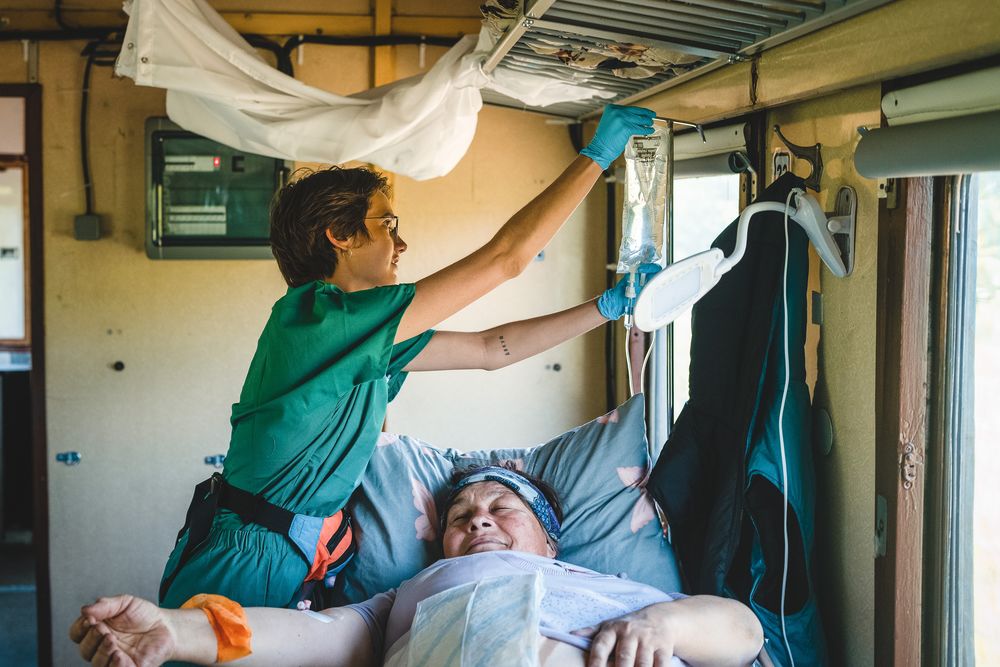Doctors on Rails: MSF train evacuates its 2,000th patient

Rubber slippers and memories of a past peaceful life are often the only belongings of patients onboard MSF’s medical train in Ukraine. They leave their homes for an uncertain future, while trying to escape from death and injuries.

"I was a soldier in Afghanistan and I can tell you that the war here, in Ukraine, is scarier."
Oleksandr from Vuhledar in Donetsk oblast (region), in the country’s east, is one of the more than 2,000 patients who have been transported by the MSF medical evacuation train. The train was established in late March, in collaboration with Ukrainian Railways. It transports patients away from overcharged hospitals in Ukraine’s east, to other hospitals which have more capacity and are further away from the front lines.
Shelling and explosions
Oleksandr was travelling on the medical train to receive further treatment for a wounded leg. During some shelling, he and his family sheltered in a basement. After 20 minutes, it seemed that things had calmed down, and he decided to go outside and get some air.
“Two or three minutes later, I heard an explosion – not like the previous ones,” says Oleksandr. “I think it was a drone. I did not have time to escape, and my leg was wounded.”
During the journey, MSF medical staff onboard put in place a device which drains excess fluid from his wounded leg.

Oleksandr from Vuhledar in Donetsk region is being transferred to a hospital in a safer region of Ukraine by the MSF medical train. He is travelling to a hospital far from the front line for examination and treatment. MSF medical staff onboard put in place a device which drains excess fluid from his wounded leg.
Oleksandr from Vuhledar in Donetsk region is being transferred to a hospital in a safer region of Ukraine by the MSF medical train. He is travelling to a hospital far from the front line for examination and treatment. MSF medical staff onboard put in place a device which drains excess fluid from his wounded leg.

Portrait of Serhiy
Portrait of Serhiy

A patient inside the intensive care unit (ICU) onboard the MSF medical train, which is specially equipped to transfer and stabalise seriously war-wounded and sick patients from the east of Ukraine to specialised hospitals in the west. (May, 2022).
A patient inside the intensive care unit (ICU) onboard the MSF medical train, which is specially equipped to transfer and stabalise seriously war-wounded and sick patients from the east of Ukraine to specialised hospitals in the west. (May, 2022).
Serhiy & Kateryna
A trip from towns in Donetsk oblast to Lviv, in Ukraine’s far west, for example, takes more than a day. To maintain patients’ medical care and support, MSF has equipped the train cars with cardiac monitors, ventilators, ultrasound machines and other medical equipment. The train is composed of eight cars, among which include beds for patients (including for those requiring intensive care) and their family members.
Serhiy and Kateryna, a married couple from Sloviansk in Donetsk oblast, are being evacuated to a hospital in Lutsk, northwestern Ukraine. Kateryna has liver cirrhosis and cannot get help at home; all the specialist doctors left the city because of the war.
“Almost all pharmacies in the city are also closed,” says Serhiy. “And those still working have a limited amount of medicine.”
Although today the train mostly transports elderly people, including those who have chronic diseases, our teams often seen children.
Vladislav
Fourteen-year-old Vladislav, from Lyman, Donetsk oblast, received shrapnel to his abdomen. He is being evacuated to Lviv, with his mother Julia, for further treatment. Julia says that he was injured by a mortar shell which hit their house while he was inside playing video games.
“While Vladislav was being taken to hospital, he was conscious, and cursing from pain,” says Julia. “He was complaining of pain in his abdomen and that he couldn’t move his legs. He said he was scared he wouldn’t survive.”
“I didn't even take shoes as such. I'm wearing rubber slippers...I hope to get back home.”
Among them is Halyna from the city of Marhanets in Dnipropetrovsk oblast. She works at a local bakery.
“During my shift, some kind of a shell exploded near the store,” says Halyna. “It was a sudden explosion, and I don't remember anything else. There were a lot of shrapnel. My right arm was wounded.”
After she has surgery, Halyna is planning to go back home. She says that her family is waiting for her.
Marharyta from Donetsk oblast had exactly the same dream. In September, she had to leave her home because of gangrene; her toe was turning black, and she also needed surgery.
“The doctor told me to move less. And how can I move less?” asks Marharyta. “I have to go to get water, because there is no running water anymore; I have to go buy food.”
For the train journey, she took with her only the necessities – a few bathrobes, soap and medication.
“I didn't even take shoes as such. I'm wearing rubber slippers.” says Marharyta. “I hope to get back home.”

Halyna from Dnipropetrovsk region lies in bed on MSF’s medical train while being transferred to a hospital in Lviv.
Halyna from Dnipropetrovsk region lies in bed on MSF’s medical train while being transferred to a hospital in Lviv.

MSF staff members bring belongings of the patients evacuated from Kharkiv city, eastern Ukraine, to a bus that will drive them to hospitals in Kyiv.
MSF staff members bring belongings of the patients evacuated from Kharkiv city, eastern Ukraine, to a bus that will drive them to hospitals in Kyiv.
